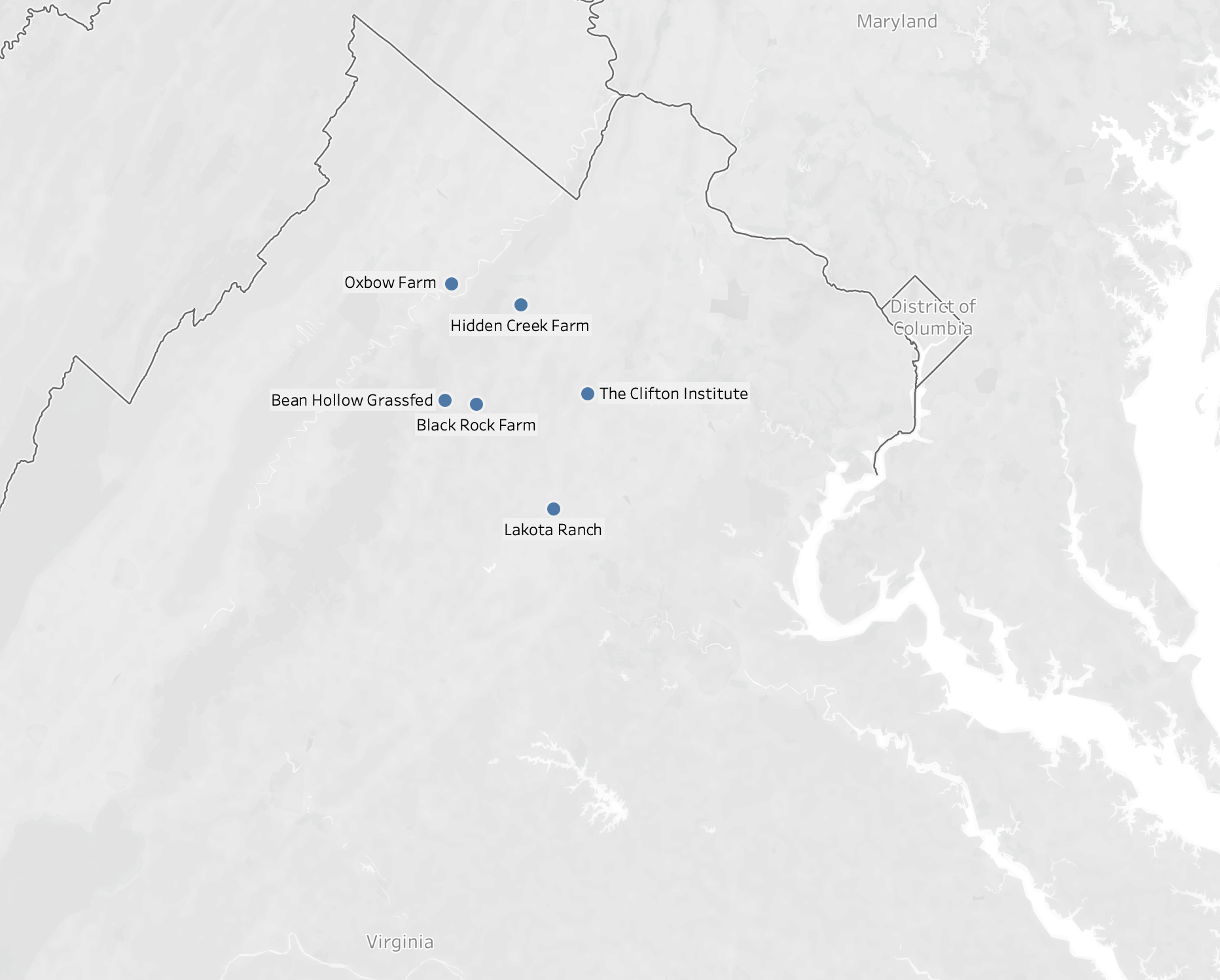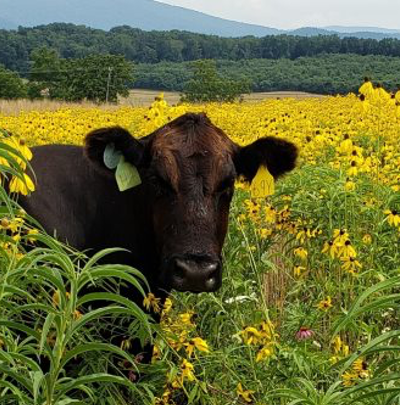Virginia Tech
Ben Tracy
Dr. Benjamin Tracy is our project leader and a professor in Virginia Tech’s School of Plant and Environmental Sciences. His research program focuses on managing plant diversity in forage-livestock systems to improve their productivity.
Catherine Larochelle
Dr. Catherine Larochelle is assistant professor in the Department of Agricultural and Applied Economics. Her research focuses on the impact evaluation of new agricultural technologies and identifying cost- effective approaches to technology dissemination. One of her roles in these projects is to assess the profitability of wildflower-enhanced pasture under farmer conditions. She will also work with livestock producers to understand barriers to the entablement and management of wildflower- enhanced pasture and identify potential approaches to overcome these barriers.
Michael Flessner
Dr. Michael Flessner is an assistant professor in Virginia Tech’s School of Plant and Environmental Sciences. Dr. Flessner’s research and extension program focuses on solving weed management challenges currently facing the Commonwealth, with emphasis placed on sustainable and economic solutions.
Leighton Reid
Dr. Leighton Reid aims to improve outcomes for conserving biodiversity, mitigating global climate change, and improving human livelihoods at regional, national, and international scales through ecological restoration, i.e., the practice of assisting the recovery of degraded ecosystems. His lab focuses on forest and grassland ecosystems in the US Southeast, Latin America, and Madagascar, where they use methods based in community ecology, landscape ecology, and interdisciplinary studies with economists, geographers, and sociologists. At Virginia Tech, he teaches courses related to Ecological Restoration.
Parry Kietzman
Dr. Parry Kietzman is a research associate in Virginia Tech’s School of Plant and Environmental Sciences. She has a background in bee behavioral ecology, health, apiculture, and pollinator conservation. Dr. Kietzman has a strong interest in conservation education and environmental stewardship. She holds a B.S. in Biology from Wheaton College (IL) and a Ph.D. in Entomology from the University of California, Riverside.
Gabriel Pent
Gabriel Pent is the Superintendent of Virginia Tech’s Shenandoah Valley Agricultural Research and Extension Center, also known as the McCormick Farm. This research farm includes more than 900 acres of pasture and forest and specializes in research in forage-based livestock production systems, ram performance testing, and forestry and woodlot management. Prior to managing farm production and research operations at this farm, Dr. Pent was the Ruminant Livestock Systems Extension Specialist at the Southern Piedmont Agricultural Research and Extension Center where he oversaw a variety of research projects on forage and livestock production, including experiments on conservation practices such as cover crops and nutrient management in forage crop production. Dr. Pent received a B.S. in Biology from the University of Central Florida and a Ph.D. in Crop and Soil Environmental Sciences from Virginia Tech.
Elizabeth Chishimba
Elizabeth Chishimba is a Ph.D. student in the Department of Agricultural and Applied Economics at Virginia Tech. Her areas of research include impact assessments, international development and trade as well as urban, rural and regional development. She is currently part of the research team responsible for evaluating the economic side of the Bee-Friendly Beef Project.
Jonathan Kubesch
Jonathan Kubesch is a PhD student working on the beef and botanical questions of bee-friendly beef. He worked in grassland agronomy and ecology in Ohio, Indiana, Tennessee, Kentucky, South Dakota, and now Virginia. Jonathan works on conserving the native clovers of the eastern United States. He earned his B.S. at the Ohio State University in 2018, and his M. S. at the University of Tennessee in 2020.
You can follow Jonathan’s project through his Instagram account, @jonathankubesch
David Bellangue
Raven Larcom
Raven is broadly interested in how pollinators respond to habitat rehabilitation. She earned her B.S. in Biology and Art at St. Lawrence University. Raven completed her M.S. at Virginia Tech in early 2023, having written a thesis on honey bee productivity and floral resource utilization with regard to planted native wildflowers in pasture systems. Raven is now working for the Xerces Society for Invertebrate Conservation as a member of the pollinator protection team.
University of Tennessee
Patrick Keyser
Dr. Patrick Keyser is professor and Director, Center for Native Grasslands at the University of Tennessee. In that role he leads research into forage production, management of native grasses, and conservation related to these systems. He also is actively engaged in outreach activities including producer workshops, in-service trainings, an on-line curriculum (Native Grass College | Center for Native Grasslands Management (tennessee.edu), and will soon be releasing a new book, “Native Grass Forages for the Eastern U.S.” Dr. Keyser has authored or co-authored numerous publications including articles in scientific journals, Extension materials, book chapters, and articles in trade and popular outlets.
Laura Russo
Jessica Prigge
Jessica is a PhD student in the department of Forestry, Wildlife and Fisheries at the University of Tennessee in Knoxville. She earned her B.S. in animal science at the University of Wisconsin River Falls in 2018 and her M.S. in animal science at the University of Minnesota Twin Cities in 2021. Her previous work explored the use of alternative annual forages in equine grazing systems and the development of new remote NIRS technology for use in alfalfa fields. Her current work investigates the agronomic and cattle production responses to incorporating native forbs and legumes into native warm-season grass pastures.
Virginia Working Landscapes
Amy Johnson
Dr. Amy Johnson is a research ecologist and program director for Virginia Working Landscapes (VWL), a community-based research program based out of the Smithsonian Conservation Biology Institute in Front Royal, VA. In this role, Dr. Johnson leads a team that cultivates a dynamic network of private landowners, citizen scientists, NGO’s, state agencies and research scientists to collectively investigate the impacts of conservation management and land use on biodiversity. In addition to research, her team is committed to developing a strong outreach program that communicates research findings to inform best management practices for regional conservation partners and the community.
Erin Thady Shibley
Erin Shibley is a wildlife biologist and Survey Coordinator for the Virginia Working Landscapes (VWL) Program with SCBI. In this role, Erin coordinates all on-farm research activities with Bee-Friendly Beef producers. In addition to coordinating research efforts with partner conservation organizations and academic institutions, she also manages a diverse network of citizen scientists to conduct grassland biodiversity surveys across the region. Erin has an M.S. in Wildlife and Fisheries Biology from Frostburg State University and a B.S. in Biology from James Madison University.
USDA
Caroline Sherony
Edward Henry
Edward Henry is an experienced ecologist with a 27-year professional career in conservation and resource management. He currently is the (acting) National Ecologist with USDA-NRCS. In this position, he focuses on the interconnections of conservation planning and practices with a focus on pollinator habitats, invasive species and the restoration of disaster impacted habitats. He has spent his career working for three federal conservation agencies, NRCS, the U.S. Fish and Wildlife Service and the National Park Service. Among his most prominent work with NRCS were developing partnerships to leverage agency resources to protect areas such as the Chesapeake Bay headwaters, the Finger Lakes watershed and costal habitats on Long Island. In addition, he reinforced and taught agency and partner staffs about the NRCS 9-steps of planning and how to apply them. He has an M.S. Degree in Forest Ecology from SUNY ESF and B.S. in Ecology from Binghamton University.
Partner Farmers for On-Farm Sites
The Clifton Institute
The Clifton Institute is a 900-acre non-profit organization. Our mission is to inspire a deeper understanding and appreciation of nature, to study the ecology of our region, and to conserve native biodiversity. Part of our restoration and research focuses on making pasture and grazing land better for birds, bugs, and native plants, so we are excited to be part of Bee-Friendly Beef. You can learn more about us at https://cliftoninstitute.org.
On-Farm Site Locations

